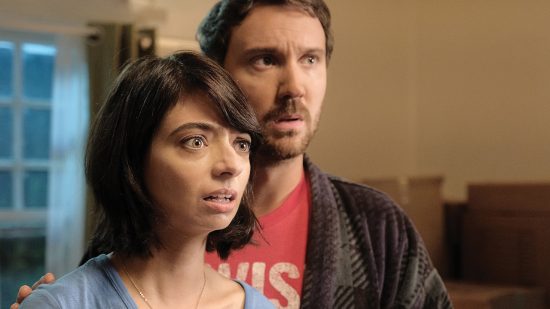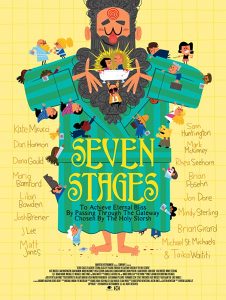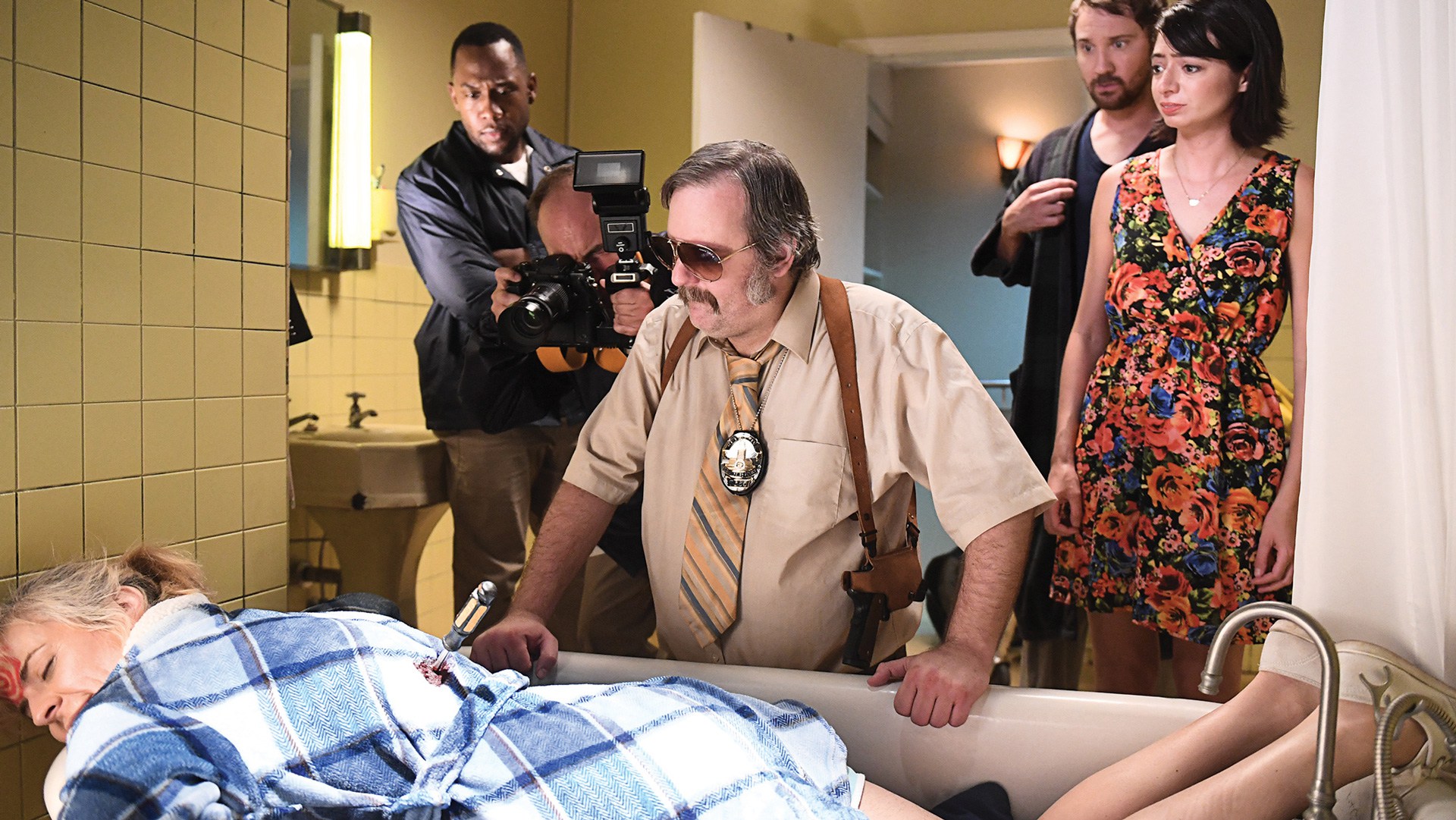 If a filmmaker wants their work to have an air of eccentricity about it, a sixteen word title isn’t a bad start. After all, it worked with The Englishman Who Went Up A Hill But Came Down A Mountain (shit, that’s a whole seventeen words if we count those ‘a’s), so who’s to say it can’t work again, right? Happily, there’s a lot more to Seven Stages To Achieve Eternal Bliss By Passing Through The Gateway Chosen By The Holy Storsh than a mouthful of a name. For one, it scores some pretty substantial fan interest points thanks to the presence of two of the most revered figures of the moment: Taika Waititi, fresh from his career-changing work as director of Marvel’s Thor: Ragnarok, and Dan Harmon, co-creator and star of the animated cult sensation Rick and Morty. However, while both Waititi and Harmon have significant roles to play in Seven Stages (as it will hitherto be referred – come on, you know you don’t want to read all that any more than I want to type all that every single time), it should be stressed that they are both very much supporting figures in a quirky, genre-bending black comedy centred on a young couple who inadvertently find themselves caught up in a bizarre religious cult.
If a filmmaker wants their work to have an air of eccentricity about it, a sixteen word title isn’t a bad start. After all, it worked with The Englishman Who Went Up A Hill But Came Down A Mountain (shit, that’s a whole seventeen words if we count those ‘a’s), so who’s to say it can’t work again, right? Happily, there’s a lot more to Seven Stages To Achieve Eternal Bliss By Passing Through The Gateway Chosen By The Holy Storsh than a mouthful of a name. For one, it scores some pretty substantial fan interest points thanks to the presence of two of the most revered figures of the moment: Taika Waititi, fresh from his career-changing work as director of Marvel’s Thor: Ragnarok, and Dan Harmon, co-creator and star of the animated cult sensation Rick and Morty. However, while both Waititi and Harmon have significant roles to play in Seven Stages (as it will hitherto be referred – come on, you know you don’t want to read all that any more than I want to type all that every single time), it should be stressed that they are both very much supporting figures in a quirky, genre-bending black comedy centred on a young couple who inadvertently find themselves caught up in a bizarre religious cult.
Claire (Kate Micucci) and Paul (Sam Huntingdon) are new arrivals in LA, moving out to the big city from Ohio for Claire’s new job in marketing. Just as they’re wondering how they got the apartment so cheap, they’re startled by a late night break-in from a seemingly deranged person who lashes out and babbles incoherently before committing suicide in their bathtub. Naturally they’re shell-shocked, and this only gets worse when LAPD Detective Cartwright (Harmon) nonchalantly surveys the scene, and tells the couple that they’d better get used to this sort of thing. Turns out their bathroom is the very place where cult leader Reginald E Storsh (Waititi) killed himself some years earlier, and ever since then his disciples have been regularly flocking to that very same place to follow in his footsteps. (Side note: at one point the film was set to use the more succinct title Corpse Tub.) You’d assume that any normal couple would naturally take their as-yet unpacked boxes and find another place, but Claire and Paul have other ideas, choosing to stay and accept the inevitable intrusions. Along the way, they both find themselves gradually becoming more receptive to the teachings of Storsh, and it’s not too long before his philosophies have entered their day-to-day life in a big way.

Seven Stages is the feature debut of Vivieno Caldinelli (a seasoned TV comedy director and short filmmaker probably best known for the crowd-funded Portal To Hell starring the late Roddy Piper), as well as being the first produced feature-length script from writers Christopher Hewitson, Clayton Hewitson and Justin Jones. I don’t think it would be unfair to say that it bears some of the hallmarks of a first feature, given that there does seem to be a bit of an everything-but-the-kitchen-sink approach going on here. For the most part it’s a pretty broad comedy, taking satirical swipes at the new age/mind, body and spirit/self-help culture which still permeates our culture; especially in LA, it seems. At the same time, though, the film does give some serious consideration as to the circumstances that might drive one to embrace the teachings of a cult, or indeed any religion: take individuals already struggling to achieve success (whatever that really means), present a message of transcendent hope which resonates with them, and soon enough they find themselves believing things they ordinarily wouldn’t. Seven Stages digs into this by presenting personal anxieties that are easy to relate to: Claire is insecure in her new job, whilst Paul is caught up in domestic lethargy, lacking the motivation or the confidence to seek gainful employment. Even Detective Cartwright is dealing with similar frustrations, anxious to leave his unfulfilling police career behind and break into the movie business.
To a large extent, then, Seven Stages is the Heathers of religious cult movies, a sharp-tongued, sardonic stab at manufactured spiritual pathways. Furthering the Heathers connection is the suicide angle, with our initially-happy couple coming to play a more active role in the loss of life as things progress. Even so, while the film can certainly be taken as an outright assault on religious belief, it also acknowledges the reality of a deep-set longing for spiritual fulfilment, and to an extent seems open-minded on whether or not being a spiritual seeker is necessarily a bad thing.
Where I feel Seven Stages sells itself short just a little is in its insistence on maintaining a light, goofy tone throughout. There’s clearly potential for the multiple murder-suicide/semi-accidental death scenes to be played a lot darker, and some developments in the final act might have proved genuinely disturbing, yet Caldinelli seems to be making a point of keeping it all tongue-in-cheek and comparatively gentle (case in point: the overly elaborate, highly cartoonish explanation behind Paul’s workplace insecurity). This isn’t necessarily a problem, but I certainly feel there was a chance here to make something a bit more nuanced and impactful. Still, this is not to dismiss the great work done by the cast: Micucci and Huntingdon make for compelling and endearing leads, Harmon supports them well, and while Waititi’s scenes are limited, he has a knack for making them count, and his presence is felt throughout. All in all, it adds up to a film I’m confident people will soon be talking about a lot, and not just because it takes a long time to say the title.
Seven Stages To Achieve Eternal Bliss By Passing Through The Gateway Chosen By The Holy Storsh just screened at Chicago’s Cinepocalypse 2018; our thanks to the festival for granting us this preview.
